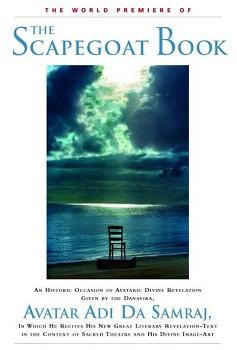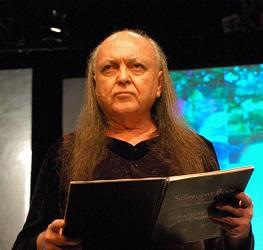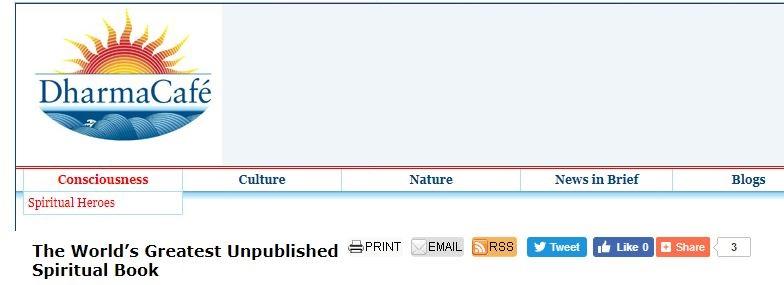
Beezone made additions by adding pictures and videos to Bill Stranger’s original essay published at:
The World’s Greatest Unpublished Spiritual Book
The World’s Greatest Unpublished Spiritual Book

Nine years ago Adi Da Samraj wrote The Scapegoat Book, a brilliant free rendering of what may well be our planet’s greatest traditional spiritual text, the Ashtavakra Gita. In 2008, at the request of The Dawn Horse Press, I wrote this introduction to the book. It is time for the world to know what it has been missing.
by William Stranger
![]() lato’s contention that poets do not make good philosophers has never rested well with the artists themselves. William Blake and W.B. Yeats, to name but two, always maintained that it is to the poets we should turn to gather our philosophic truth alive.
lato’s contention that poets do not make good philosophers has never rested well with the artists themselves. William Blake and W.B. Yeats, to name but two, always maintained that it is to the poets we should turn to gather our philosophic truth alive.
Jordan Peterson – Maps of Meaning, Lecture #9
“The artists get there before the philosopher’s, long before the philosophers. The dramatists get there way before the artists even! And so we figured it out. We represented it in art and literature and music and drama. And then we’re on the cusp so to speak of understanding it in a fully articulated manner.”
In The Scapegoat Book Adi Da finally puts that controversy to its much deserved rest, along with a great many other confusions and disputes yet wandering the ever-shifting borderlands between literature and philosophy. For this concentrated, heart-breaking, but infinitely illuminating fable now stands as the single greatest literary dramatization ever written about both the nature of the non-dual wisdom of Consciousness and the precise anatomy of our tragic failure to Realize It.
Adi Da Samraj, 2006
In presenting ultimate, or, as he names it here, “perfect knowledge” (the Realization that we are not now, and never have been, a separate ego-self), in the dramatic circumstance of the incarceration and scapegoating of the one who reveals that truth, Adi Da is able to explore the most devastating problematique of human culture: our unconscionable, insane habit of destroying the very people whose help we most desperately need. In his The Scapegoat Book we are brought to confront, in a manner that freely alternates the excruciating and the sublime, the deluded, willful, narcissistic postures whereby we mock and betray those truly great individuals we otherwise pretend to venerate. The tragedy, of course, is that in so doing we nullify our own best means of freedom and liberation, as well.
Adi Da spontaneously composed The Scapegoat Book over a period of six weeks, in October and November, 2005, while in residence at his northern California Hermitage-Sanctuaries, Tat Sundaram and The Mountain Of Attention, in Humboldt and Lake counties, respectively. On January 14, 2006, in conjunction with the Da Orpheum Theatre Guild, he read the work at the Da Orpheum Theatre, which at the time was located at the latter Sanctuary. Like most of those present for this extraordinary event, I found it to be both a transcendental spiritual initiation and the single most searing theatrical experience of my life. The Scapegoat Book is literary drama of the very highest order.
The Scapegoat Book is the second of Adi Da’s Da Orpheum trilogy, three astonishing masterworks that, taken together, chronicle the life story and spiritual teachings of the infant sage and destined Avatar Raymond Darling (etymologically, “the precious light of the world”). Although designed to be read in sequence as a single parable “Told by Means of a Self-Illuminated Illustration of the Totality of Mind”, each work also stands on its own. Through his trilogy, Adi Da brings together, reforms, and completes the three great streams of world culture: Oriental (Hindu, Buddhist, Taoist) spirituality’s ultimate wisdom of non-dual Self-Realization, Western civilization’s Orphic quest to rescue the beloved from death’s annihilation, and the existential and postmodern philosophers’ radical subversion of the bourgeois ego and its faux culture.
To carry the full weight of this epochal artistic/cultural intervention, Adi Da has had to invent out of whole cloth three new complex literary genres. If the first work in the trilogy, The Mummery Book, is at once a Bildungsroman, a quest romance, a paradox-ridden spiritual odyssey, a comedy, an opéra bouffe, a satyr’s play, a farce, a passion play, and, a colossally unevitable (or unnecessary) tragedy, and the third, The Happenine Book, is Raymond Darling’s own written, spoken, and illustrated chronicle of the trials, magic, humor, perfect wisdom, and both solemn and ecstatic doings of his early life and teaching work, then in The Scapegoat Book Adi Da allows himself the singular concentration of a fugue—a complex countrapuntal weaving together of the sublime and the absurd, written for two voices and a single Witness.
Adi Da adapts philosophy’s venerable dialogue form to create an extended dramatic conversation between the Avataric Sage Raymond Darling and his self-proclaimed disciple (and unconfessed captor), the grotesquely obese “Great Fool” Evelyn Disk. Through their discussion of the nature and requirements of ultimate Realization of the non-dual Divine Reality, Adi Da ventures nothing less than to initiate us—if only for the brief time of its performance—into the highest truths of Divine Self-Realization, while simultaneously confronting us with the hypocrisies, false views, delusions, and outright lies whereby we would falsify, make a scapegoat of, and ultimately destroy the means and bearer of that very Gift.

Adi Da Samraj reciting ‘The Scapegoat Book’, 2006
Thus, The Scapegoat Book performs a function in relation to The Mummery Book and The Happenine Book much the same as the eighteenth chapter of the Bhagavad Gita (the “bible” of Hinduism)—in which Krishna has the Warrior-Prince Arjuna step aside from his epochal battle with the Kauravas for an extended moment to consider the essence of spiritual truth—does for that book. In both works, the central issue at hand is our willingness to renounce the entire patterned conceit that is our egoity in direct relationship to the Realizer, whose blessing guidance and grace we judge to be the sole and absolutely necessary means of our spiritual salvation. By itself, however, such renunciation is not sufficient for Realization. Without an awakening to perfect knowledge, it becomes mere self-denial. Thus “the necessary circumstance of Truth—Self-Revealed, by Avatar” is only found “as perfect re-coincidence, between the all of true renunciation and the What that is, alone, true liberation, in the Self-“Bright” singularity of perfect-knowledge-only here.” One glaring difference between the two epics, however, is that the Bhagavad Gita’s Arjuna is a magnificently disciplined nobleman who has spent his life in preparation for his moment of testing, while this work’s interlocutor, Evelyn Disk, is a clever but fatuous and self-indulgent spiritual poseur who, were it not for the fact that we live in the “End-Time” of universal cultural dissolution, would have otherwise never even be given access to the true teaching.
Continue reading:
